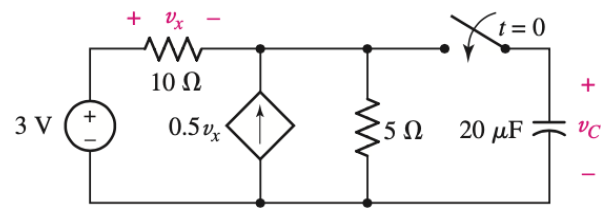I'm trying to find the Isc of this circuit seen by the capacitor at t > 0 so I could find the Rth and get the circuit's time constant. If I make the capacitor a short circuit, it will be in parallel with the resistor. Is it right to assume that no current will flow through the 5ohm resistor?
Then I have the KCL equation:
V1 would be the voltage in the dependent source's node.
Isc = (Vsource - V1)/R1 + 0.5(Vsource - V1)
I already found V1 which is 2.25 V.
Am I doing this right?

